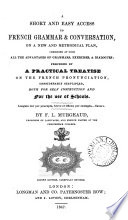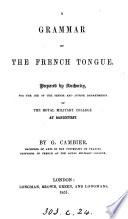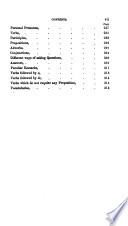 There would be as many," said he, "if I was being taken to the scaffold5." 1 verite ; - foule ; •"' accourait ; 4 parts ; 5 echafaud. THE ADVERB. Place of the Adverb. 1. In French, the adverb is generally placed after the verb in simple tenses, and... There would be as many," said he, "if I was being taken to the scaffold5." 1 verite ; - foule ; •"' accourait ; 4 parts ; 5 echafaud. THE ADVERB. Place of the Adverb. 1. In French, the adverb is generally placed after the verb in simple tenses, and...  The first French book - Page 100by Henri Bué - 1878 - 155 pagesFull view The first French book - Page 100by Henri Bué - 1878 - 155 pagesFull view - About this book
 | Désiré Pontet - 1844 - 286 pages
...tenses of the indicative, but never in the subjunctive, place the personal pronoun subject to the verb after the verb in simple tenses, and between the auxiliary and the participle in compound tenses, joining them with a hyphen (-) ; and if the verb or the auxiliary end... | |
 | F L. Murgeaud - 1847 - 244 pages
...ADVERB is an invariable word which modifies a verb, an adjective, or another adverb. It is usually placed after the verb in simple tenses, and between the auxiliary and the participle in the compound ones, but never (as in English) between the nominative and the verb. Examples... | |
 | Désiré Pontet - 1847 - 634 pages
...French by ne, placed immediately after the subject, whether it be a noun or pronoun, and pas or point after the verb in simple tenses, and between the auxiliary and the participle in compound tenses. — When the verb is in the infinitive present, it is optional to place... | |
 | Charles Jean Delille - French language - 1851 - 506 pages
...they frequently are in Enzliih, between the nominative when a conjunctive pronoun and the verb, but are generally placed after the verb in simple tenses, and between the auxiliary and the participle in compound ones ; as, Je vous le donne tolontierg, I willingly (five it you. J'ai bien... | |
 | G. Cambier - 1851 - 342 pages
...might have circonspect been more cordial. sinvere Remark. — Adverbs, with few exceptions, must be •placed after the verb in simple tenses, and between the auxiliary and the participle in compound tenses, when this adverb is only a single word. Simple Tenses. Compound Tenses.... | |
 | E. Dubac - 1852 - 554 pages
...placed together before infinitives; but in general ne comes before the verb, and the other negation is placed after the verb in simple tenses, and between...auxiliary and the past participle in compound tenses (6). 781. Non, no, not, is the negation used in opposition to the affirmation, oui, yes (7); si, si... | |
 | Camille Lantenant - 1857 - 314 pages
...ne is put immediately after the nominative or subject, whether it be a noun or a pronoun, and pas, after the verb in simple tenses, and between the auxiliary and the past participle in compound tenses. EXAMPLES. je ne parle pas I do not speak je n'ai pas parlé I have not spoken nous ne jouons pas we... | |
 | Jean Gustave Keetels - French language - 1858 - 396 pages
...as subjects, are placed before ',he verb, except — (1.) In interrogative sentences; when they are placed after the verb, in, simple tenses, and between the auxiliary and the When Is tmtt an adjective ? When an ailverb ? When is the adverb timt varied f LXXX11 — 1. Which... | |
 | O. C. Angoville - 1858 - 724 pages
...hour. SECOND REMARK. — When tout, adjective, accompanies the relative pronouns le, la, les, it is placed after the verb in simple tenses, and between the auxiliary and the participle past in compound tenses: — Je les al tous his, eljeles trouve I have read them all, and... | |
 | Charles Henri Schneider - French language - 1861 - 360 pages
...Fréquemment, Frequently. Tout à coup, On a sudden. Bien, Well. Très, Very. EULE 258. In French, the adverbs are generally placed after the verb in simple tenses, and between the auxiliary and the participle in compound tenses. — lfa. Il lui écrit souvent. Il lui a souvent écrit. He often writes... | |
| |